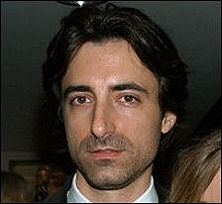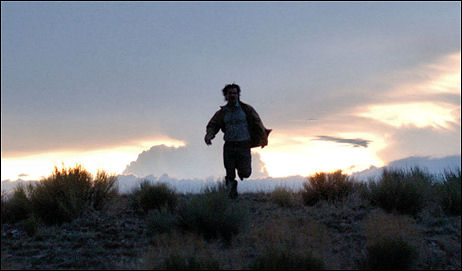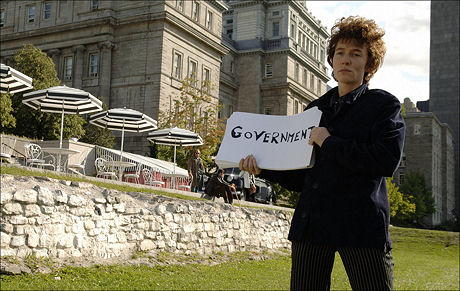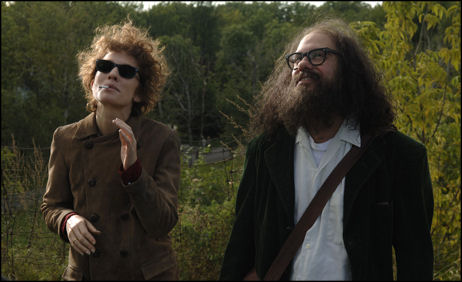They’ve stuck it to The Band’s Visit again! Following an unfortunate AMPAS precedent, the HFPA Golden Globe committee in charge of foreign pix has announced that this small, heartfelt Israeli comedy is ineligible for the best foreign film prize because it has too much English in it. I’ve seen The Band’s Visit and know for a fact this is an ignorant and deeply unfair way to categorize this tender, at times Chaplinesque little film. Bah humbug! to the HFPA and anyone else who doesn’t get that English is the worldwide second language for all cultures today, and that everyone speaks it when they don’t understand each other’s tongue. It doesn’t invalidate anything for characters in an Israeli or Pakinstani or Taiwanese or Hungarian film to speak English when they have no recourse. Meaningless!
Day: November 14, 2007
So Bad They’re Good
In her 11.14 L.A. Times/Envelope piece called “So Bad, They’re Good,” Lisa Rosen notes that “a lot of good actors went bad this year. Real bad. Surly, mean, reprehensible, criminal, unforgivable and pretty much irresistible.
“Critics and audiences alike have been enjoying the nasty performances of the likes of Denzel Washington in American Gangster, Philip Seymour Hoffman in Before the Devil Knows You’re Dead, Casey Affleck in The Assassination of Jesse James by the Coward Robert Ford and Russell Crowe and Ben Foster in 3:10 to Yuma.”
The fact that Rosen waits until the very end of the piece to mention the year’s ultimate bad-ass performance, Javier Bardem as Anton Chigurh in No Country for Old Men, looks like a show of rank xenophobia to me. Rosen and her editors decided to list only name-value American thesps in the opening graph, apparently on the presumption that L.A. Times readers don’t want to know from gifted Spanish-speaking actors. And yet no bad-guy performance is more likely to see awards attention this year than Bardem’s.
Goldstein on WGA Strike, week #2
L.A. Times “Big Picture” columnist Patrick Goldstein “spent much of last week talking to studio executives, eager to hear a good explanation for months of one-sided negotiations, where the studios essentially presented a series of rollback offers and then bashed the writers for not embracing them. None of the studio chiefs would talk on the record, but if I were to sum up their views, I’d put it this way: The future is too uncertain for us to give anything away.”
Goldstein explains that Hollywood “has always been a land of fear and anxiety. It’s why the town’s most-repeated maxims involve the slippery grip on the pole of success — why just root against your enemies, for example, when you can root for your friends to fail too. Everyone in this nasty labor dispute has profound insecurity about the future, an attitude deeply rooted in industry history.”
You Tube addendum: Jason Ross, one of the Daily Show‘s 14 writers, explains things from his perspective in this video dated 11.13.07, or yesterday.
Hillary weakened?
Hillary Clinton‘s performance in the 10.30 debate made her seem vulnerable for the first time. And now Robert Novak is reporting that “an 11.6 Zogby poll of 502 likely Iowa caucus-goers showed Clinton’s lead had shrunk to three points — within the survey’s 4.5% margin of error. The narrowing, however, is mostly due to an Obama surge, from 19 percent in Zogby’s August poll to 25 percent.”
A N.Y. Times assessment, based on a Times/CBS News poll, finds the Democratic contest “essentially tied in Iowa” between Clinton, Obama and Edwards. The mind-blower is that a strong majority of respondents said that Obama and Edwards are more likely than Clinton to say what they believe, rather than what they think voters want to hear. And yet Clinton, respondents feel, is “the best prepared and most electable Democrat in the field.”
Silly me thinking all this time that likability — how high a candidate ranks according to Dating Game criteria — was a deciding factor among most voters.
The dream scenario is that Clinton comes in second to Obama in Iowa, and Obama takes this momentum with him to New Hampshire and South Carolina. Of course, the only way to really take her down is for Edwards to bail so everyone can rally around one Hillary-alternative candidate instead of two.
White goes after Baumbach
Margot at the Wedding “isn’t a story of neurotics struggling to be loved” but an example of director-writer Noah Baumbach “struggling to validate middlebrow narcissism,” writes N.Y. Press critic Armond White. White can be oddly hilarious when he goes after someone, and in this case he outdoes himself by comparing Baumbach to a rodent. [Note #1: Running this item shouldn’t and doesn’t indicate agreement with White about the analogy, but I chuckled at it.]


Margot at the Wedding director-writer Noah Baumbach (l.)
Baumbach “perverts lessons in humanity taught by Eugene O’Neill, Tennessee Williams and even Wes Anderson, the great visionaries of American family and class warfare,” White goes on. “He domesticates bigotry. The kitchen confrontation between Jennifer Jason Leigh‘s Pauline and Jack Black‘s Malcolm is not an ethical, emotional trade-off; each cowardly egotist talks at cross purposes through Baumbach’s smug dialog. He’s always looking for malice and humiliation, as when a rat is discovered at the bottom of the family swimming pool.
“Nicole Kidman tries making Margot pitiable, but she remains a cold actress. Brave Leigh, the finest film actress of the ’90s, gets disgraced. Baumbach not only turns Leigh’s fearlessness into Isabelle Huppert-style masochism, he offends her person with a scene where Pauline shits her panties. And we see it. Baumbach can’t guide us through troubled emotions like O’Neill, Williams and Anderson; he leads us into the shallow end of arrogance, conceit and ugliness. The rat at the bottom of the pool is Baumbach himself.”
[Note #2: Baumbach actually shows us a small dead mouse, not a rat. If I’m wrong, it’s one of the smallest dead rats I’ve ever seen, and I’ve seen a few. A real dead rat is the size of the one Marlon Brando holds by the tail in Last Tango in Paris.]
Blanchett’s attention-seeking
In an 11.12 Commentary piece, Kyle Smith straddles the line between praise and derision in this short essay about Cate Blanchett‘s already-legendary Bob Dylan performance in Todd Haynes‘ I’m Not There. When Blanchett “pops up it is immediately clear” — and as was the case with her appearance as Kate Hepburn in The Aviator — “that this is an Oscar role,” Smith says.
What he means is that it’s one of those “look at me!” performances, and is more about Blanchett wanting attention for being adventurous in playing a guy than her finding the soul of the Dylan character and making it come newly alive. Smith is saying, in short, that Blanchett is faintly obnoxious on some level. He couldn’t be more wrong. She’s intoxicating. But more to the point, you can see into the angst and weariness of the Blonde on Blonde-era Dylan. (I’ve always loved that line “my weariness amazes me.”)
Has there ever been an Oscar-contending performance that hasn’t been at least partly about “look at me!”? Does Smith think Laurence Olivier wasn’t doing this in his 1948 Hamlet? How is wanting audiences to stop what they’re doing and pay attention to an particular actor’s energy or technique a bad thing? As long as these aspects don’t overcome the soul of a performance, where’s the harm?
“Though Blanchett is strenuously coiffed and made up to look like Dylan, [her] wisp of a figure and porcelain cheekbones make it impossible to forget this is a drag performance. In a scene in which her Dylan chases an Edie Sedgwick-like object of obsession around a park, she doesn’t seem remotely masculine. She gives off no sexual hunger, no sense of need.”
Exactly! She’s playing Dylan chasing a girl but also Blanchett-the-temporary-lesbian chasing a girl, which gives it a whosis-whatsis dimension. Nothing is totally straight and sincere in I’m Not There. Everything you see and hear is a kind of mind game. I loved this aspect. It’s so trippy and experimental that it almost leaves you with a kind of pot contact high.
“In the end,” Smith conclude, “all Blanchett ever needs in any film is our rapt attention.”
And she’s gotten it from me and just about everyone I else I’ve spoken to. She’s dead certain to be nominated for Best Supporting Actress, and you have to figure she’ll prevail with this and that critics group also.
Here, again, is a like to Kyle Smith online, and to his Blanchett Commentary piece.
Hammond + Wells chat
After listening to Tom O’Neil talk about the No Country for Old Men situation with Pete Hammond this morning, I called Hammond and asked if he’d mind discussing the same stuff with me also, and he said fine.
Spielberg at the Globes
Indy 4 kowtow, down on their knees, obeisance before power.
O’Neil, Hammond on “No Country”
Although he’s now allowing that No Country for Old Men will probably eke its way into one of the five Best Picture slots, The Envelope‘s Tom O’Neil is reporting, based on five or so conversations, that the widely-admired Coen brothers film is eliciting respect but not a lot of great passion among Academy fudgeballs.

O’Neil speaks here to Envelope columnist Pete Hammond about No Country‘s lofty rep among critics, and how this will most likely translate into Academy-level support. Unless, that is, the softies dig in their heels and “just say no,” either directly or passive-aggressively.
O’Neil himself isn’t a great No Country admirer (he admits this), but if you know Tom you know he isn’t really speaking about quality judgment as much as the proverbial “longing for comfort” factor. We all understand, I think, why O’Neil and his Academy chums are cool to this landmark film, and it starts, oddly enough, with what N.Y. Press critic Armond White called it — “a crime movie for a world at war.”
In saying this White is rehashing an old truism, which is that all great films reflect the world in which they were made as much as the literary source material that they’re based upon. A-level artists are always responding to the electric here-and- now, and the Coen brothers were certainly in this groove when they shot and cut this film in ’06 and early ’07.
No County for Old Men is a period film set in 1980, but it’s saying four dark things about the world of 2007. One, you can’t see what’s coming. Two, you can’t stop what’s coming. Three, the decent people are starting to be outnum- bered by the indecent ones. And four, a kind of spiritual apocalypse is gathering like storm clouds and surrounding our culture.
So there is no comfort for old Academy members in this film, even though it embodies lasting art and immaculate craft. Especially with that “unsatisfying ending” that I’m sure is sticking in their craw — that kitchen-table scene with Tommy Lee Jones lamenting the loss of decency and dependability (as embodied by his father) in his own life, and again admitting to himself and to us that he’s feeling overwhelmed and outflanked by the bad guys.
It’s also interesting that neither Hammond nor O’Neil mention Sidney Lumet‘s Before The Devil Knows Your’e Dead as a Best Picture contender. They apparently feel it’s out of the running — when did that happen? Hammond feels, however that Sidney Lumetis in contention for Best Director. How do you say “yes” to a director but “no” to his/her film?
The leading feel-good comfort providers, according to these two, are The Kite Runner, The Diving Bell and the Butterfly and, in O’Neil’s words, “even” Atonement.
Kennedy’s King speech
Newsweek‘s 1968 issue — “the year that made us who we are” — has a strong, finely woven article called “The Worst Week,” about the five-day span in which LBJ announced his decision not to run that year and the assassination of Martin Luther King. This mp3 of Kennedy delivering his famous speech in Indianapolis in which he announced King’s death is still pretty moving. Who among the current Presidential candidates could have delivered an impromptu speech of this calibre if they’d been in the same position? Not Mitt Romney.


